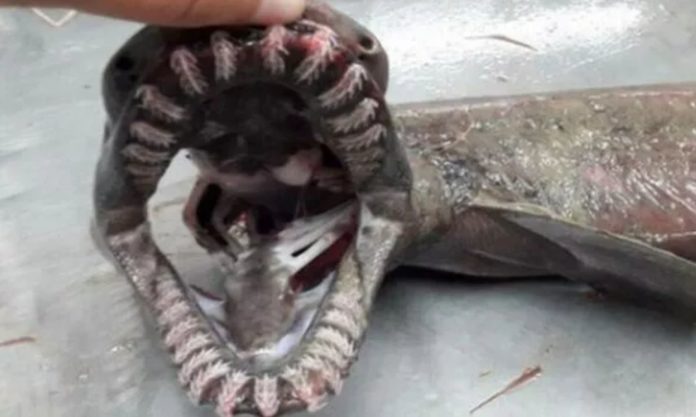The frilled shark is a 300-toothed prehistoric species that has been roaming the oceans since the time of the dinosaurs. The animals, dubbed “living fossil” haven’t evolved much in the last 80 million years.
However, coming across these perplexing creatures is not a common event these days. That’s why, in 2017, fishermen in Portugal were taken aback when they discovered a frilled shark 2,000 meters beneath the sea’s surface.
Researchers announced at the time that they were working on an EU effort to reduce unwanted catches in commercial fishing after discovering one of the ocean’s rarest findings.
The shark was about five feet long, and images of it were published online, revealing its frightening teeth and enormous body.
It was captured in Portimao, near the Algarve, at a depth of 700 meters (2,300 feet).
Because the species is so uncommon, the Portuguese Institute for the Sea and Atmosphere acknowledged that very little is known about it.
There is also very little footage of the animals in their natural habitats, which are deep in the Atlantic Ocean and off the coasts of Australia, New Zealand, and Japan.
Despite their rarity, it is believed that the creatures swim in a snake-like way.
Additionally, they are believed to prey on squids, other fish, and maybe other shark species.
Their 300 scary long teeth are arranged in numerous rows in their mouths, each with three long tips that are perfectly suited to seizing prey.
Their jaws allow them to “trap squid, fish, and other sharks in sudden lunges,” according to Professor Margarida Castro of the University of the Algarve.
They are also distant relatives of other well-known sharks such as Great Whites, with thin and long bodies.
However, the encounter in Portugal was not the first time the elusive creatures were spotted by fishermen.
In 2007, a fisherman reported an “odd-looking eel-like creature with a mouthful of needle-sharp fangs” to the Awashima Marine Park in Shizuoka, south of Tokyo.
When the 1.6-metre creature was captured, it was discovered to be a female frilled shark.
The Japanese marine park’s staff were even fortunate enough to capture some incredible footage of the frilled shark swimming around.
An official from the park said: “We believe moving pictures of a live specimen are extremely rare.
Image Credit: SIC NOTICIAS
You were reading: Dazzling Mystery of Ancient Creature With 300 Terrifying Teeth Caught By Fisherman
